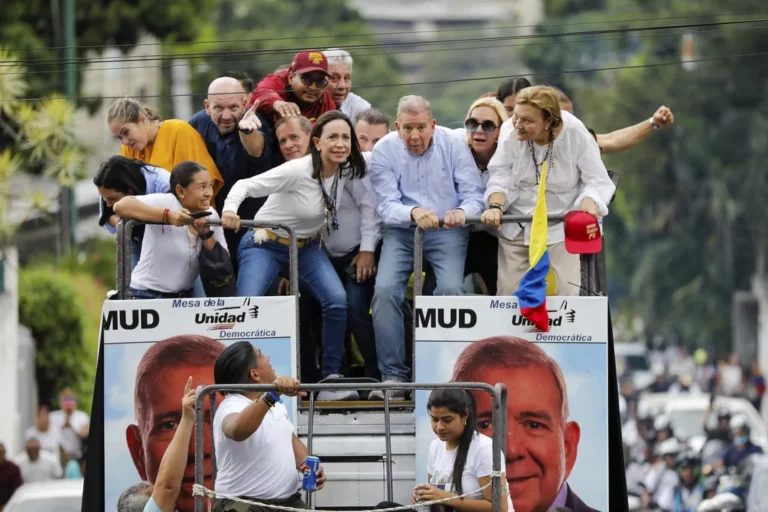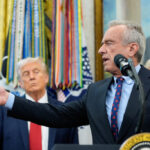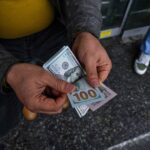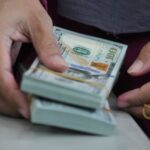
Already, the moment is sliding away. Once again, Nicolas Maduro has declared himself president after an obviously sham election in Venezuela. Once again, the only countries to accept the validity of the poll are Russia, Iran, China, Belarus, and the international delinquents.
In 2018, it briefly looked as if the country’s long nightmare was over. The free world refused to endorse Maduro’s sham election, instead recognizing as president the leader of Congress, Juan Guaidó, who was constitutionally next in line.
For a few weeks, it seemed as if the dictatorship might crack, and there was excited talk of U.S.-backed regime change. But the moment passed, and six years on, Maduro still sits on top of a diminished population — diminished both in the sense that nearly 8 million Venezuelans have been driven abroad and in the sense that those who remain are suffering from malnutrition.

This time, the fraud was much more blatant. First, the candidate whom the opposition had picked through a mass-participation primary, Maria Corina Machado, was predictably disqualified and ludicrously accused of anti-Venezuelan activities. Then, her nominated successor was disqualified without even pretense at due process.
Finally, the opposition nominated a harmless retired diplomat, Edmundo Gonzalez, whom the Chavista regime seemed able to live with. It looked as if Maduro, who had earlier met opposition leaders in Barbados and agreed to free elections, might keep his word.
Instead, Venezuela saw vote-rigging on a scale that, in other circumstances, would be comical. Someone had evidently decreed that the minority candidates would get 4.6% in total. But, through some miscommunication, they were allocated 4.6% each, meaning that the preliminary results showed a total 127% vote share.
Scrutineers at local polling stations, knowing that the rigging would happen centrally, kept records of the tally sheets, which show that the opposition won more than 73% of the vote. But Maduro declared himself the victor by just enough to avoid a runoff and blamed suggestions to the contrary on Elon Musk.
In a bizarre press conference, the former bus driver lapsed performatively into the rough dialect of Caracas’s barrios. “Fink you’re ’ard, then, Elon Musk, do ya” he growled (this is the most authentic translation I can manage). “Like we used to say in my manor, you an’ me, outside, now!” His generals applauded through rictus grins.
Viewed from a distance, all this has an opéra bouffe quality. But for Venezuelans, there is nothing to laugh at. Most people had taken victory for granted, and the brazenness of fraud led to violent clashes, which prompted Maduro to call for a roundup of opposition candidates.
The Chavistas are cornered and dangerous. Populist-left regimes in neighboring countries are refusing to go back them. The governments of Colombia and Chile, both led by radical socialists, have rejected the outcome, and even Brazil’s Luiz Inácio Lula da Silva evidently feels that Maduro has gone too far this time.
But the only government whose opinion counts right now is that of the United States. Maduro has plainly calculated that, with a comatose president and a looming election, the yanquis won’t have time to worry about him. He may be right.
If so, it is a pity. Restoring democracy to Venezuela, through active and vigorous support for the opposition, and a willingness to deal with whichever general is the first to realize that the game is up, would be the single greatest gift the U.S. could give its hemisphere. Millions of refugees would return home. Wealth would again flow into neighboring countries. The West would no longer rely on energy from dictators.
Most importantly, it would be a meaningful stand for democracy — a system that has been in retreat for over a decade now. The long advance of liberty went into reverse at the start of the last decade, possibly because of the financial crisis, possibly because of the deadening effect of smartphones, and possibly because of something else. Whatever the cause, dictators are becoming more blatant.
CLICK HERE TO READ MORE FROM THE WASHINGTON EXAMINER
While autocrats have always found ways to disqualify opponents, the flagrancy we see these days — Pakistan’s election earlier this year was another recent example of almost comical vote-rigging, with some polling stations declaring turnouts of over 100% — is telling.
Put bluntly, the autocrats can see that there is no cop on the beat. The West has been unable to restore the independence of Ukraine and has been reduced to begging for cheaper oil from Gulf tyrannies. If the U.S. can no longer maintain order in the Americas, where almost every state shares its view of Venezuela, supporters of democracy and the rule of law might as well go home.








